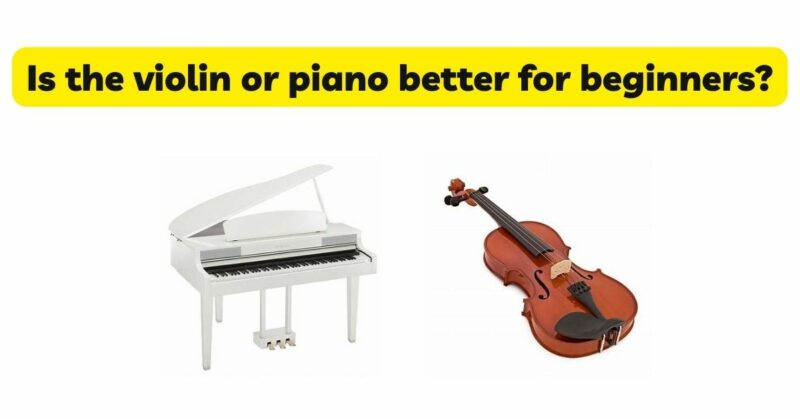Embarking on a musical journey as a beginner is an exciting and transformative experience. Among the myriad instrument choices, the violin and the piano are often considered top contenders. When it comes to selecting the ideal instrument for beginners, factors such as ease of learning, technicality, versatility, physical demands, and personal preferences need to be considered. In this article, we will explore the suitability of the violin and the piano for beginners, aiming to provide an informed perspective to assist aspiring musicians in making an optimal choice based on their individual circumstances and aspirations.
- Ease of Learning: The ease of learning an instrument is an important consideration for beginners. Both the violin and the piano present unique challenges. The piano offers a visual representation of notes on the keyboard, making it easier to understand music theory and pitch relationships. Beginners can quickly grasp basic melodies and harmonies. The linear layout of the keyboard facilitates learning to read sheet music and recognize patterns. The violin, on the other hand, requires learning finger placements, bowing techniques, and intonation simultaneously. Producing a clear and resonant sound on the violin can be more challenging initially. However, with dedicated practice and guidance, beginners can achieve proficiency on either instrument.
- Technicality: The technical aspects of an instrument play a crucial role in a beginner’s journey. The piano provides a solid foundation for understanding music theory, harmony, and rhythm due to its linear keyboard layout. Learning to coordinate both hands, read sheet music, and develop finger independence are essential skills. The violin requires mastering proper bowing technique, finger placement, and intonation to produce a beautiful sound. Coordinating the bowing arm, finger movements, and pitch accuracy can be initially challenging. However, once the fundamental techniques are established, the violin offers a unique platform for expressiveness and musicality.
- Versatility: Versatility is an important consideration for beginners who wish to explore various musical genres and styles. The piano is known for its versatility, allowing beginners to delve into a wide range of musical genres, from classical to jazz, pop, and beyond. With its polyphonic capabilities, the piano can provide a comprehensive musical foundation and accompaniment skills. The violin, although often associated with classical music, is also adaptable to different genres such as folk, jazz, and world music. While the piano offers a broader range of musical possibilities, the violin’s expressive qualities can be captivating for those seeking a more focused musical experience.
- Physical Demands: Physical demands should be taken into consideration when choosing an instrument. The piano requires finger strength, dexterity, and hand coordination to navigate the keyboard. While beginners may initially find the physicality of the piano challenging, the instrument provides a stable platform for playing. The violin demands proper posture, balance, and muscle control. Holding the instrument under the chin, maneuvering the bow, and executing precise finger movements require physical coordination and stamina. It is important to assess one’s physical comfort and readiness to commit to the physical demands of the chosen instrument.
- Personal Preferences: Personal preferences and musical inclinations are vital factors in selecting an instrument. Consider the genres of music that resonate with you and the kind of musical experience you wish to pursue. If you are captivated by the piano’s versatility, the ability to play complex harmonies, and a desire to perform solo or accompany others, it may be the instrument that suits your preferences. On the other hand, if you are drawn to the expressiveness, intimate playing style, and desire to be part of an ensemble, the violin might be a better fit. Reflecting on personal preferences and goals will guide you toward the instrument that aligns with your musical aspirations.
- Learning Resources and Support: Access to quality learning resources and support is crucial for beginners. The piano benefits from a wealth of readily available instructional materials, method books, and qualified teachers. Online resources, apps, and interactive tutorials further enhance the learning experience. The violin may require more specialized guidance to ensure proper technique and posture. Assess the availability of violin teachers, method books, and access to suitable repertoire in your area. Consider the support systems and learning resources that will enable you to thrive on your chosen instrument.
Conclusion: Determining whether the violin or the piano is better for beginners depends on individual factors such as ease of learning, technicality, versatility, physical demands, personal preferences, and the availability of learning resources. The piano offers a visual and versatile learning experience, making it easier to understand music theory and providing a solid musical foundation. The violin, although presenting initial challenges, offers expressiveness and the opportunity to be part of ensembles. Personal preferences and musical aspirations should guide the decision-making process. Remember that whichever instrument you choose, dedication, consistent practice, and guidance from qualified instructors are key to unlocking your musical potential. Embrace the instrument that resonates with you, cultivate your passion, and embark on a fulfilling musical journey as a beginner musician.


